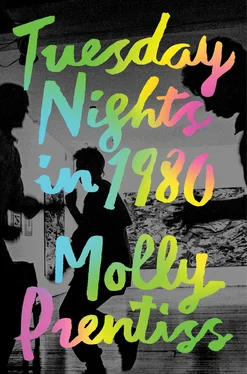Franca pushes her way through the wind, down the six blocks to the café. Whenever she feels the familiar pang of nervousness she reminds herself that she looks harmless in her friendly blue coat, carrying the cake she’s made for her friends. She remembers what Raul used to tell her: You’d make the perfect radical, Franca. Because you look so fucking nice. The part of her heart that belongs to her brother pulses: if only he could see her now. She quickly wonders what would have happened if he had stayed, but stops herself. Raul never responded to her letter — she could bring herself to try writing only once — and has never called the house. And so her brother will never know about these meetings, about Pascal’s leaving, or about Julian, her greatest — perhaps her only — accomplishment. Her brother will never even care. Still, she knows, she’s here at Café Crocodile for Raul.
Inside, Franca nods to El Jefe, the boss of the place and Lara’s father. El Jefe doesn’t smile with his mouth but from somewhere in his forehead. Franca remembers his forehead from all the mornings they came here when she was small, when El Jefe’s hair was still black. She remembers running toward the counter with Raul, jumping on the stools and begging El Jefe for lemonades.
“They’re downstairs,” says El Jefe, his voice as distinguished as a butler’s.
The code: knock three times, cough once. The basement door will open just a crack, which is when you must say: Jacobo, the password. Usually: the whole lot of them smile at her silently, mime pulling zippers over their mouths while the door is open. Usually: she sits in the orange chair closest to the door, pulls out her notes, gets started with the transcripts. But now: Something is different. Something is wrong.
No one is sitting and no one is smiling. The basement is all movement. Sergio is shoving a mess of papers into his old leather briefcase. Mateo, usually the calm one, full of jokes and immaculate impersonations of the generals, is jamming piles of books under the bed, the still-burning chunks from his cigarette falling onto the carpet, glowing orange and then dying. Lara, with her pretty, ash-colored braid, is ripping pages from the binder where they keep track of all the names — the names of the people who have gone missing, which they’ve been recording since the very first meeting: there are thousands now. And Wafa, who is sitting on the couch with her head in her hands, is weeping.
Mateo, panting from the weight of the bed he is lifting, says without turning toward Franca: “Remo’s gone.”
Franca feels a swift rush of blood through her body. She knows exactly what this means. Remo is Wafa’s husband, and if they know where Remo lives, they know where Wafa lives. This means they might very well know where Wafa is right now, that Wafa is here, which means they might have followed Wafa, six men in plainclothes, driving very slowly down Calle Defensa, watching Wafa’s skirt sway as she stepped inside the café. And they might still be waiting just outside, the windows of their Ford Falcons rolled down, the sunlight reflecting off their mirrored sunglasses, their cigarettes burning the minutes away, the minutes before they barge through Café Crocodile’s big glass doors, hold a gun to El Jefe’s head until he tells them where those fucking radicals are hiding, sparing El Jefe because the ones they want are downstairs, down the spiral staircase and through the locked basement door, which they can easily knock through with their rifles, which they will use to dig into the backs of these fucking radicals as they drag them to their low, fat, black, heavy cars.
Julian appears in Franca’s mind so vividly it is as if he is in the room. Wide eyes, small hands. Too smart for a six-year-old, overly wise, since birth. Just yesterday he’d asked her in his tiny voice: Mama, when the government gets fixed, can we visit the Brother, first thing? Smart enough to know the country was broken, hopeful enough to think it could be fixed, astute enough to intuit his mother’s secret wish: to leave for America; to find Raul. It’s not likely, she’d said, so as not to get his hopes up. Or were they hers, these hopes?
She tries to remind herself that she’s made a plan for this. Julian is at a friend’s this evening, Lars’s house; she has specifically set it up this way. The fact that Lars’s parents, Sofie and Johan, are Danish, and are free to come and go from Argentina at their own will, is no accident. The stack of American dollars she’s stashed in Julian’s backpack is no accident. But the fact that there is a plan at all is the very reason she’s worried. She thinks of Sofie and Johan: blond, strict, too formal. She thinks of how scared Julian will be if she does not come to pick him up, how he will not like it if he has to spend the night in their house, which is so cold and full of angles. She suddenly longs for Pascal. If only she had been better to him. Raul was wrong about him, she knows, but she had let his opinion overshadow everything, like she always had, like she was doing still, here in this basement full of radicals: each a ticking time bomb. Look where listening to Raul has gotten her: her only son is alone in a strange house; her only husband is gone. And Raul? He’s gone, too. He’s the most gone of anyone.
Franca attempts to speak, to ask some question or give some answer, but finds that she cannot; her whole nervous system has gathered in her mouth. Her claustrophobia intensifies, a slow pinching of the room. When she looks up it is as if the basement has shifted slightly, as if the walls are now at a diagonal. She has the sensation she gets when she visits somewhere she has been before and the layout of things seems changed, but she can still remember the way she inhabited the space before: an unfaithful déjà vu.
Wafa lets out a low moan. “What about Simon?” she suddenly blurts, as if just remembering. Franca imagines Wafa’s small son, Simon: just a year older than Julian. Suddenly everything goes wavy. The smoke from Mateo’s cigarette is burning her eyes. Franca’s hands slacken; the cake falls to the carpeted floor with a thud. Everyone — Sergio, Mateo, Lara, Wafa — stops what they are doing to look at her, letting a silence as dense as the cake fill the room. Their eyes are frosted over with panic. Then Sergio, suddenly possessed, does something so odd that Franca wonders if it’s a hallucination. He takes the binder from Lara and rips out one of the pages, crumples it, and kneels next to Franca’s fallen plate. Then he rips off the sheet of foil, stuffs the paper into a piece of the soft, still-warm cake, and shoves the slice into his mouth. Lara kneels, too, grabs a list of names, stuffs them into the cake, starts to chew. Then Mateo comes, then Wafa. They swallow the names of the people who are missing. They swallow what could get them killed.
Franca feels a sudden surge of pride in the cake. A cake that’s worth something, that’s pulling its weight. But this feeling leaves as swiftly as it comes, because just as Mateo is finishing his slice of cake, digging in for another, she is filled with two distinct regrets. She’s left the oven at the bakery turned on. She’s left her little boy with no one. And all she can do now is sit here on her knees, swallow, wait for the banging on the basement door.
PORTRAIT OF MANHATTAN BY A YOUNG MAN
BODY: A tight torso, flexing with a million muscle groups. Neighborhoods connected by taxi blood. Hefty, hard shoulders of Harlem, strong pectorals of the Upper East and West Sides, the spine of Central Park and the messy lungs of Midtown. Go farther down and find the pancreatic sack, surrounded by bile, just below Union Square, and even farther are the bowels and bladders of downtown, filled with beggars, booze, little pockets of bright. And what of the parasites that have eaten up these lower guts? Who have eaten out the insides of downtown’s most wary buildings? Look harder. Ventricle streets, hydrant valves; way down here is the city’s throbbing heart.
Читать дальше












